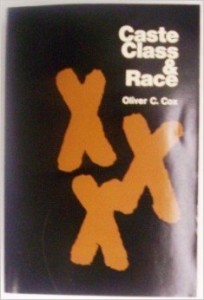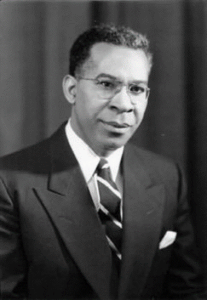 The book Caste, Class and Race: A Study in Social Dynamics by the Trinidadian born, US-based scholar Oliver Cromwell Cox is a major work of sociological theory and secondary analysis. It is hard to do justice to a book of over six hundred pages of meticulous scholarship. It, stands out as a landmark of sociological analysis that defies intellectual categorisation and exists alongside Weber’s Economy and Society as a classic of the field, sadly neglected compared to the latter, but ultimately surpassing it in terms of its analysis of the concepts of caste, class and race. Published in 1948 it was written in response to an emerging interest in (white) sociology in understanding race in the US through the lens of ‘caste’, as was proposed by Gunnar Myrdal in his American Dilemma (1944). While other Black academics – including those who worked with Myrdal, such as Ralph Bunche – preferred the language of class analysis to Myrdal’s preferred language of caste, it was left to Cox to provide a detailed examination of caste, class and race that went beyond rebuttal to provide a systematic sociological examination of the different systems of caste, class and race and the intersections among them.
The book Caste, Class and Race: A Study in Social Dynamics by the Trinidadian born, US-based scholar Oliver Cromwell Cox is a major work of sociological theory and secondary analysis. It is hard to do justice to a book of over six hundred pages of meticulous scholarship. It, stands out as a landmark of sociological analysis that defies intellectual categorisation and exists alongside Weber’s Economy and Society as a classic of the field, sadly neglected compared to the latter, but ultimately surpassing it in terms of its analysis of the concepts of caste, class and race. Published in 1948 it was written in response to an emerging interest in (white) sociology in understanding race in the US through the lens of ‘caste’, as was proposed by Gunnar Myrdal in his American Dilemma (1944). While other Black academics – including those who worked with Myrdal, such as Ralph Bunche – preferred the language of class analysis to Myrdal’s preferred language of caste, it was left to Cox to provide a detailed examination of caste, class and race that went beyond rebuttal to provide a systematic sociological examination of the different systems of caste, class and race and the intersections among them.
Cox begins by demonstrating that caste in India is not a racialized system; it is a system based on ‘function’, not ‘blood’. And, in contrast to slavery, it is based on consensus, not coercion. Indeed, it is the mark of the quality of the analysis, that Louis Dumont in his study of the Indian Caste system, Homo Hierarchicus: The Caste System and its Implications (1970), exempts Cox from the strictures directed at others writers of applying ‘Western’ understandings to a system ‘alien’ to its categories and, indeed, follows arguments first set out by Cox. According to Cox, there is no dynamic of change within a caste system deriving from discontent of subordinated castes, sub-castes, or unscheduled groups; the dynamic of caste is reproductive of the system of caste and it is exogenous factors that create the likelihood of change. It is for precisely these reasons that Cox believes the application of the language of caste to race relations in the USA was misconceived. It represents a poor understanding of caste and a poor understanding of race and it was politically inept in terms of its proposed solution to the ‘American dilemma’, namely that the values inherent to the ‘American creed’ would remove the stain of racism. For Cox, the racialized system of the US was precisely the product of the intersection of class relations and democracy; the values inherent in democracy could not be expected to disrupt racialized hierarchy since they were integral to its constitution. The puzzle to explain is how a system based on a principle of equality can create racialized hierarchy and it is no solution to this puzzle to have recourse to caste – a coherent system based on the principle of inequality.
The chapters on class in the book may perhaps look less original to a modern eye well-tutored in Marxism, than they would have been to Cox’s contemporaries, yet they contain the same brilliant originality as his account of caste. His explanation of the constitution of the capitalist mode of production in class relations might seem standard fare, but a closer reading shows that something else is at work. In order, to demonstrate how race and class intersect as a problem of democracy, Cox breaks the Weberian conceptual association of social class and status groups as being alike in the sense that each is constituted as a collectivity. This is the same mistake he finds in the treatment of caste (and, of course, the association of caste, status and social class is precisely to be found in Weber). For Cox, the crucial characteristic of a social class system is that it is ‘individualistic’ and it is this that facilitates political mobilisation that occurs in democracy. ‘Political class’ is a radical self-identification and it doesn’t follow directly from a lower social class position, but from association in the pursuit of political ends. In this way, Cox reveals a sympathy with American pragmatism that goes back to du Bois. From a sociological perspective, it re-configures the Weberian trinity of ‘class’, ‘status’ and ‘party’ and does so through an engagement with race (itself largely missing from Weber).
 In the course of the book, Cox also manages to deliver the most stinging attack on the dominant mode of analysis of ‘class stratification’ in sociology. This is where the sociologist defines ‘objective class/occupational positions’ according to some set of criteria, assigns populations to these classes (or aggregates), and then considers their ‘subjective’ responses to membership in these common aggregate groups. It remains the standard sociological approach, whether these aggregates are called classes (whether using neo-Marxist or neo-Weberian conceptualisations) or some other term (‘occupational groups’, etc). As Cox suggests, variation within supposedly discrete aggregates is potentially as considerable as that which divides groups, since the indicators that are used to construct the aggregates are distributed continuously (more or less income; more or less authority in the workplace etc). The real substance of class, for Cox, lies in the associations that are formed among people; that is in class solidarities, constructed through action. ‘Class’ is constructed in action and association, not from the a priori definitions of sociologists.
In the course of the book, Cox also manages to deliver the most stinging attack on the dominant mode of analysis of ‘class stratification’ in sociology. This is where the sociologist defines ‘objective class/occupational positions’ according to some set of criteria, assigns populations to these classes (or aggregates), and then considers their ‘subjective’ responses to membership in these common aggregate groups. It remains the standard sociological approach, whether these aggregates are called classes (whether using neo-Marxist or neo-Weberian conceptualisations) or some other term (‘occupational groups’, etc). As Cox suggests, variation within supposedly discrete aggregates is potentially as considerable as that which divides groups, since the indicators that are used to construct the aggregates are distributed continuously (more or less income; more or less authority in the workplace etc). The real substance of class, for Cox, lies in the associations that are formed among people; that is in class solidarities, constructed through action. ‘Class’ is constructed in action and association, not from the a priori definitions of sociologists.
The current crisis in US race relations suggests that Cox’s pessimism about the unfolding of the ‘American Creed’, was not misplaced. Democracy and racial hierarchy are no less entwined than when Cox wrote and his study goes a very substantial part of the way toward explaining why that is so.
Essential Reading
Cox, Oliver Cromwell (1948) Caste, Class, and Race: A Study in Social Dynamics Monthly Review Press: New York
Further Reading:
Adolph Reed Jr (2001) ‘Race and Class in the Work of Oliver Cromwell Cox’ Monthly Review 52(9), February 2001.
Barbara Celarent (2010) ‘Caste, Class, and Race by Oliver Cromwell Cox’, American Journal of Sociology, 115 (5). Barbara Celarent is a pseudonym of Andrew Abbott.
Louis Dumont (1970) Homo Hierarchicus: An Essay on the Caste System. Chicago, IL: Univewrsity of Chicago Press.
Questions:
Why does Cox think that caste and class are antithetical systems?
Why does Cox think that caste is a deficient way of describing racial hierarchies that derive from the intersection of class and democracy?
How does standard class analysis in sociology fail to address the dynamics of class?
Submitted by John Holmwood
As a recent recipient of the graduate school certificate in African studies at ASU, my final drew from or focused in part on the settler narrative movement of the antebellum era. Despite the discovery of over 100 burials from this era that came to light recently, it was all treated in a quite troubing manner. Settler Colonial mentality was pervasive. It is clear, the slave labor narrative must be preserved at all cost. Local professional organizations and offices were disrespected and ignored as if the descended community did not exist. People wear the continuance of mixed relationships from this history and it is only now that they are finding their voice and their heritage in some cases. Global social theory is spot on.
I’m interested in colonialism,settler colonialism and decolonisation as it speaks to the original ownership of the land/country[?].
I was interested to read ‘the tendency among some scholars of settler colonialism to treat settlement as inevitable, simultaneously relieving settler societies and states of the burden of reconciling with indigenous peoples, and placing the burden of accommodating settler sovereignty onto those same indigenous peoples'[above]
I have been tentatively searching for references to the morality/legality of colonialisation,which could possibly have huge ramifications,and they are scarce.
Interesting. Could you please add Maria Lugones’s work in the further reading section please? She not only engaged with Quijano’s concept but revised it significantly to demonstrate the coloniality of gender. Thank you.